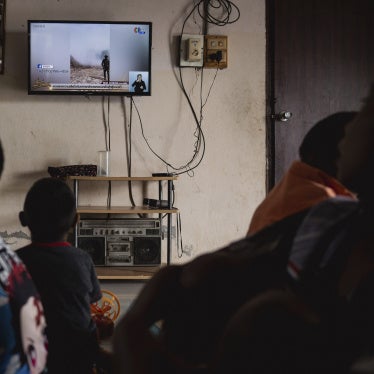In a letter to Prime Minister Mahathir released today, Human Rights Watch expressed grave concern over the recent spate of arrests of prominent government critics in Malaysia, including attorneys, activists and opposition leaders. In the letter, Human Rights Watch charged that the arrests have further eroded the credibility of Malaysia's legal system, and said this latest crackdown bodes "ill for long-term stability in Malaysia."
The international human rights organization protested the arrests, which took place in the past week, of Karpal Singh, a well known defense lawyer; Mohamed Ezam Mohamed Nor, a leader of the National Justice Party founded by Anwar Ibrahim's wife, Dr. Wan Azizah; Marina Yusoff, vice-president of the National Justice Party; Zulkifli Suong, editor of the Islamic party newpaper Harakah; and Chia Lim Thye, owner of the paper's printing company.
Human Rights Watch criticized Malaysia's use of the sedition law --under which four of the five arrested were charged -- and pointed out that these are the latest in a long series of legal cases against Malaysian citizens expressing views critical of the government. Such expression is a basic right guaranteed by international law.
The text of the letter follows:
January 19, 2000
Datuk Seri Dr. Mahathir Mohamad
Prime Minister's Department
Jabatan Perdana Menteri
Jalan Dato Onn
50502 Kuala Lumpur, Malaysia
Dear Prime Minister Mahathir:
We are writing to express our grave concern over the recent spate of arrests of prominent government critics in Malaysia. These arrests have further eroded the credibility of the Malaysian legal system.
Among those arrested in the past week were Karpal Singh, one of Malaysia's most prominent defense attorneys; Mohamed Ezam Mohamed Nor, a leader of the National Justice Party, founded by Anwar Ibrahim's wife Dr. Wan Azizah; Marina Yusoff, vice-president of the National Justice Party; Zulkifli Sulong, editor of the Islamic party newspaper Harakah; and Chia Lim Thye, owner of the newspaper's printing company. All five were arrested based on statements or allegations they made or printed in the run-up to nationwide elections last November. Four of the five arrested were charged with violating Malaysia's sedition law.
The sedition law, originally enacted by British colonial authorities, limits free expression by broadly criminalizing any speech which is judged to have a "seditious tendency," including speech which tends "to bring into hatred or contempt or to excite disaffection against" the government or which tends to promote "feelings of ill-will and hostility between different races." The vague language invites selective application. In 1998 the law was used to jail outspoken opposition parliamentarian Lim Guan Eng, to investigate Anwar, and to question Wan Azizah. It is ironic that your government, which has been so critical of the "neocolonial" behavior of other nations, should enforce a colonial-era law against its critics.
Deputy Prime Minister Badawi has publicly stated that the arrests stemmed from "investigations following police reports filed by several people" and has denied any intention to single out opposition leaders. He has claimed that the government is simply enforcing the law and thereby upholding freedom. The Deputy Prime Minister's statements, however, do not explain why, when numerous police reports were also filed against ruling party officials and their allies during this same post-election period, only opposition figures are being arrested.
The recent arrests are the latest in a series of legal cases against Malaysian citizens who openly express critical views. Prominent cases currently pending include that of women's rights activist Irene Fernandez and that of former deputy prime minister Anwar Ibrahim, both of whom are in the middle of protracted, expensive trials.
Selective prosecution of critics violates their basic rights as guaranteed by international law. We believe that the recent arrests, by further polarizing the political field, bode ill for long-term political stability in Malaysia. We call on you as chief executive to insure that the law in Malaysia is not used for politically motivated proceedings against activists, attorneys, journalists, and opposition leaders. Those who peacefully express critical views should not be subject to arrest.
Thank you for your consideration of these important matters. We look forward to your reply.
Very truly yours,
/s/
Joe Saunders
Deputy Director, Asia Division
For further information contact:
Joe Saunders (New York) 212-216-1207
Mike Jendrzejczyk (Washington) 202-612-4341








